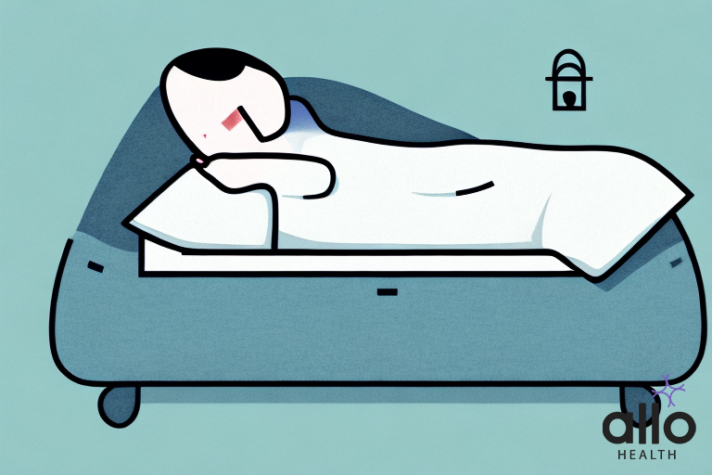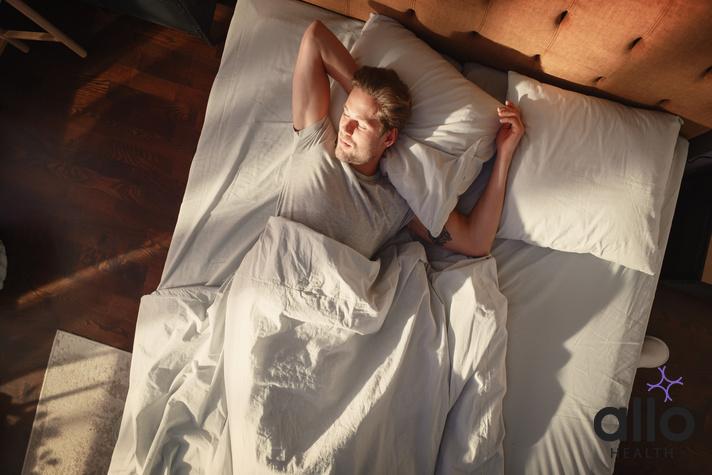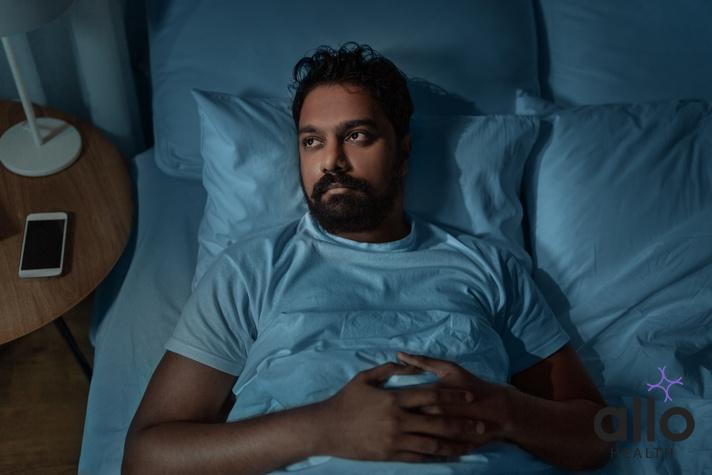What Does No Morning Erection Indicate?

Allo Health is dedicated to personalized well-being, offering support and trusted information tailored to individual health goals. The platform emphasizes human-generated content, led by a distinguished medical team of experts, including physicians and sexual health specialists. Their commitment to credibility involves rigorous fact-checking, authoritative research, and continuous updates to ensure accurate, up-to-date information. Allo Health's unique approach goes beyond conventional platforms, providing expert-led insights and a continuous commitment to excellence, with user feedback playing a crucial role in shaping the platform's authoritative voice.

Dr.Joshua has completed his MBBS from Father Muller Medical College,Mangalore.He has been a mental health advocate since the last 6 years and the cofounder of Talkaloud,an NGO dealing with mental health issues in youths and teenagers.He has keen interest in sexual health and has contributed widely in bringing awareness to the general public on the topic.
Why This Was Upated?
Our experts continually monitor the health and wellness space, and we update our articles when new information became available.
Updated on 08 April, 2024
- Article was updated as part of our commitment to diversity, equity, and inclusion.

"The following blog article provides general information and insights on various topics. However, it is important to note that the information presented is not intended as professional advice in any specific field or area. The content of this blog is for general educational and informational purposes only.
Book consultation
The content should not be interpreted as endorsement, recommendation, or guarantee of any product, service, or information mentioned. Readers are solely responsible for the decisions and actions they take based on the information provided in this blog. It is essential to exercise individual judgment, critical thinking, and personal responsibility when applying or implementing any information or suggestions discussed in the blog."
Morning erections are a natural occurrence in men where the penis gets hard and erect during sleep or upon waking up. A lack of morning erections can be a cause of concern for many men, as it could be a symptom of underlying medical conditions such as erectile dysfunction (ED).
In this article, we will delve deeper into the science behind morning erections, the common causes of a lack of morning erections, and how to treat them.
What is Morning Erection?
- A morning erection, scientifically known as “nocturnal penile tumescence” (NPT), is a natural physiological phenomenon experienced by many individuals with a penis.
- It refers to the occurrence of an erection during sleep or upon waking up in the morning.
- This phenomenon is not necessarily linked to sexual arousal or dreams, but rather is believed to be a result of the body’s natural regulatory processes related to blood flow and hormonal levels during sleep.
- During the REM (Rapid Eye Movement) stage of sleep, which is associated with vivid dreaming, the body experiences increased blood flow to various parts, including the genital area. This increased blood flow can lead to an erection.
- Morning erections are a normal and healthy aspect of male physiology, and they are not indicative of sexual desire or arousal.
What Does It Mean to Have No Morning Erection?
When an individual does not experience a morning erection, it may indicate various factors at play. This absence can be influenced by factors like hormonal levels, stress, sleep quality, or even underlying health conditions.
Occasional absence of morning erections is not necessarily a cause for concern, but if it becomes a persistent concern, seeking advice from a healthcare professional is recommended. They can provide specific guidance and potential solutions based on an individual’s unique circumstances.
Hormone Levels:
Hormone levels play a crucial role in regulating various bodily functions, including sexual health and function. Testosterone, a hormone primarily produced in the testicles, is particularly relevant to the occurrence of morning erections.
Testosterone levels tend to be highest in the morning, which can contribute to the likelihood of experiencing a morning erection. When testosterone levels are lower than usual, it can potentially lead to a reduced frequency or absence of morning erections.
Several factors can influence testosterone levels, including:
- Age: Testosterone levels tend to naturally decline as men age, which can lead to a decrease in the frequency of morning erections.
- Stress and Anxiety: Elevated stress levels can lead to an increase in the stress hormone cortisol, which can, in turn, affect testosterone production and potentially lead to a decrease in morning erections.
- Sleep Quality: Poor sleep quality or insufficient sleep can disrupt the body’s hormonal balance, potentially leading to lower testosterone levels and a decrease in the likelihood of morning erections.
- Health Conditions: Certain medical conditions, such as hormonal disorders, diabetes, obesity, or cardiovascular issues, can affect hormone production and subsequently impact the occurrence of morning erections.
- Medications: Some medications can interfere with hormone levels and potentially lead to a decrease in morning erections.

Stress
Stress can impact various aspects of a person’s physical and mental well-being, including sexual health. When it comes to morning erections, high levels of stress can disrupt the delicate balance of hormones and physiological processes that play a role in achieving and maintaining an erection.
Here’s how stress can potentially lead to a lack of morning erections:
- Increased Cortisol Levels: When a person experiences stress, the body releases higher levels of the stress hormone cortisol. Elevated cortisol levels over an extended period can affect the production and regulation of other hormones, including testosterone, which is important for sexual function.
- Reduced Testosterone Production: Prolonged or chronic stress can lead to a decrease in testosterone production. Testosterone is a hormone that plays a crucial role in sexual desire and the ability to achieve and sustain an erection. Lower testosterone levels can lead to a decreased frequency of morning erections.
- Affect on Sleep Quality: Stress can disrupt sleep patterns and lead to poor-quality sleep. Adequate, restful sleep is important for maintaining healthy hormone levels, including testosterone. When sleep is compromised, it can have a negative impact on sexual function, including the occurrence of morning erections.
- Psychological Factors: Stress can lead to anxiety, depression, and other mood disorders. These psychological factors can directly affect sexual desire and performance. Additionally, the mental preoccupation with stressors can divert attention away from sexual thoughts and stimuli, making it more difficult to experience an erection.
- Vascular Effects: Chronic stress can contribute to cardiovascular issues, such as high blood pressure. These conditions can impair blood flow to the penis, which is crucial for achieving and maintaining an erection.
Sleep Quality
Sleep quality can indeed have an impact on the occurrence of morning erections. Adequate and restful sleep plays a crucial role in maintaining overall physical and mental health, including sexual function. Here’s how poor sleep quality can potentially lead to an absence of morning wood:
- Hormonal Regulation: During sleep, the body undergoes various hormonal shifts and releases. Testosterone, a hormone critical for sexual function, tends to peak during the early morning hours. Disrupted or insufficient sleep can disrupt this natural hormonal rhythm, potentially leading to lower testosterone levels. Reduced testosterone levels can contribute to a decrease in the frequency of morning erections.
- Nitric Oxide Production: Nitric oxide is a chemical that helps relax and widen blood vessels, facilitating the flow of blood to the penis. It plays a key role in achieving and maintaining an erection. Quality sleep supports the production and regulation of nitric oxide. Inadequate or poor-quality sleep can lead to impaired nitric oxide production, potentially impacting the ability to achieve and sustain an erection.
- Nervous System Regulation: Sleep is crucial for the proper functioning of the autonomic nervous system, which controls various involuntary bodily functions, including sexual arousal and response. Disrupted sleep patterns can affect the regulation of this system, potentially influencing sexual function.
- Psychological Well-being: Poor sleep quality can lead to mood disturbances, such as increased stress, anxiety, and depression. These psychological factors can directly impact sexual desire and performance. Additionally, when a person is fatigued or mentally preoccupied due to lack of sleep, it can be more challenging to become sexually aroused.
- Overall Health Impact: Chronic poor sleep can contribute to a range of health issues, including cardiovascular problems and metabolic disorders. These conditions can affect blood flow, hormonal regulation, and other physiological processes relevant to sexual function.
Underlying Health Conditions
Underlying health conditions can significantly impact various aspects of a person’s physical well-being, including sexual health. When it comes to lack of morning wood, certain medical conditions may cause the disruption of physiological processes (such as blood circulation) and hormonal balance necessary for achieving and maintaining an erection. Here’s how underlying health conditions can potentially lead to a lack of morning erections:
- Cardiovascular Disease: Conditions like hypertension (high blood pressure) and atherosclerosis (narrowing of the arteries) can impede blood flow, including to the penis. Adequate blood flow is essential for achieving and sustaining an erection. When blood flow is compromised, it can lead to difficulty in getting or maintaining an erection, including during the morning.
- Diabetes: Diabetes can have a significant impact on both nerve function and blood vessel health. It can lead to diabetic neuropathy (nerve damage) and vascular issues, both of which can affect the ability to achieve and maintain an erection. These effects can contribute to a decrease in the frequency of morning erections.
- Hormonal Disorders: Conditions that disrupt the endocrine system, such as hypogonadism (low testosterone levels) or hyperprolactinemia (elevated levels of the hormone prolactin), can directly impact sexual function. Testosterone, in particular, is crucial for sexual desire and the ability to achieve and maintain an erection.
- Neurological Conditions: Disorders affecting the nervous system, such as multiple sclerosis, Parkinson’s disease, or spinal cord injuries, can disrupt the signals between the brain and the genital region. This can lead to difficulties in achieving and sustaining an erection, including during the morning.
- Obesity: Obesity is associated with a range of health issues, including hormonal imbalances, cardiovascular problems, and metabolic disorders. These factors can collectively contribute to difficulties in achieving and maintaining an erection, potentially leading to a decrease in the frequency of morning erections.
- Psychological Conditions: Conditions like anxiety, depression, or chronic stress can have a profound impact on sexual desire and performance. They can also interfere with the physiological processes necessary for achieving an erection.

What To Do Next:
If you’re experiencing a lack of morning erections and it’s causing concern, here are some steps you can take:
1. Monitor and Track: Keep a record of your experiences. Note how often you have morning erections, any changes in lifestyle, stress levels, or health conditions that may be relevant. This information can be helpful when discussing the issue with a healthcare professional.
2. Review Lifestyle Factors:
- Exercise: Engage in regular physical activity, which can improve blood flow and overall health.
- Diet: Maintain a balanced diet that supports overall health and sexual function.
- Sleep: Ensure you’re getting enough restful sleep to support hormonal balance.
3. Manage Stress: Practice stress-reducing techniques such as meditation, deep breathing exercises, yoga, or mindfulness to help regulate cortisol levels and support hormonal balance.
4. Limit Alcohol and Recreational Drugs: Excessive alcohol consumption and drug use can negatively impact sexual function. Moderation or cessation may be beneficial.
5. Review Medications: Some medications can affect sexual function. If you’re on any medications, discuss potential side effects with your healthcare provider.
6. Consult a Healthcare Professional: If the issue persists or is accompanied by other concerning symptoms, it’s important to seek advice from a healthcare provider. They can conduct a thorough evaluation, discuss your medical history, and potentially order relevant tests.
7. Hormone Testing: If necessary, your healthcare provider may recommend hormone testing to assess levels of testosterone and other relevant hormones.
8. Address Underlying Health Conditions: If any underlying health conditions are identified, following the recommended treatment plan can help improve sexual function.
9. Psychological Support: If stress, anxiety, or other mental health factors are contributing to the issue, consider speaking with a mental health professional.
10. Maintain Open Communication: Discuss any concerns or changes with your partner, if applicable. Open communication can help reduce any emotional strain associated with the situation.
Remember, occasional absence of morning erections is not necessarily a cause for concern. However, if it becomes a persistent concern or is accompanied by other symptoms, seeking medical advice from a healthcare professional is recommended.
Key Takeaways
- Morning erections are natural and occur during sleep or upon waking up. Lack of them may signal underlying conditions like ED.
- The article explores morning erections, their science, causes of absence, and potential treatments.
- Morning erection (nocturnal penile tumescence) is a natural physiological response, not necessarily linked to arousal.
- No morning erection may be influenced by factors like hormones, stress, sleep quality, or health conditions.
- Occasional absence isn’t alarming, but persistent concerns should prompt consultation with a healthcare professional.
- Lifestyle adjustments, stress management, and seeking healthcare advice are steps to address the concern.
Frequently Asked Questions
Q: Can tobacco consumption cause lack of morning erection?
A: Yes, tobacco consumption can potentially contribute to a lack of morning erections. It can lead to reduced blood flow and impair vascular function, affecting erectile quality, including morning erections.
Q: Is lack of morning erection a result of performance anxiety?
A: Yes, performance anxiety can be a factor contributing to a lack of morning erections. The psychological stress and anxiety associated with sexual performance can disrupt the physiological processes necessary for morning erections to occur.
Q: Is no morning erection a sign of erectile dysfunction?
A: Not necessarily. While the absence of morning erections can be a symptom of erectile dysfunction, occasional occurrences are normal. Persistent absence, however, may warrant consultation with a healthcare professional for further evaluation.
Q: What are erectile dysfunction symptoms?
A: Erectile dysfunction symptoms include difficulty achieving or maintaining an erection, reduced sexual desire, and possible emotional distress. It can be a sign of underlying health conditions and may warrant medical attention.
Q: Can excessive consumption of alcohol cause lack of morning erection?
A: Yes, excessive alcohol consumption can lead to a lack of morning erections. It can disrupt hormonal balance, affect blood flow, and impair nervous system function, all of which contribute to difficulties in achieving and maintaining an erection.
Q: Is nocturnal erections same as morning wood?
A: Yes, “nocturnal erections” and “morning wood” both refer to the natural phenomenon of experiencing an erection during sleep or upon waking up. They are different terms used interchangeably to describe the same physiological occurrence.






































